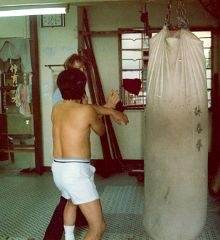INTERVIEWS
Interview: Philipp Bayer on Wong Shun Leung
INTERVIEW: PHIIPP BAYER ON WONG SHUN LEUNG (ENGLISH ONLY)
The first time I met Philipp Bayer was back in 1994, and later again in 1995 during our seminars with Wong Shun Leung in The Netherlands. Philipp is well-known for his honed skills and exceptional speed in Ving Tsun. A very memorable person, especially if you have ever seen him in action.
I got to know Philipp, with respect to Ving Tsun, as a straightforward and very intelligent person. He always tries to find a more personal approach and therefore the best possible way to help a person to achieve their training goals. No BS, just pure action!
Every weekend, somewhere in the world, Philipp will be conducting a seminar at one of the schools of his many students. Every year in December, I have the honour of organising one such seminar at my schools in Harderwijk and Zeewolde, The Netherlands.
His deep knowledge of the Ving Tsun system, and his enthusiasm shown while demonstrating it, has inspired many people over the years. This man breathes Ving Tsun. He is Ving Tsun!
Philipp’s exceptional skills in Ving Tsun are a piece of the legacy that Wong Shun Leung left behind for us. He hasn’t written any books (though he is currently working on one), or published instructional DVDs, nor is he hosting any open seminars. Philipp does not like that kind of publicity very much. In honour of his teacher, Wong Shun Leung, Philipp agreed to do this interview with us.
Dave: Can you share us the story how you met Sifu Wong in your search for Ving Tsun in Hong Kong and the story of your acceptance as his student?
Philipp: Before I went to Hong Kong, I used to be a huge Bruce Lee fan and started to learn Wing Tsun in Germany, but after the tragic accident where I lost my left hand, my trainer at that time, had the opinion that I could not continue learning due to my handicap. I definitely had a different idea on that. Eventually I travelled to Hong Kong to prove otherwise.
Unfortunately the search was very disappointing and I couldn’t manage to find myself a suitable teacher. I visited around 5 or 6 different schools. All ‘of course’ claimed to be closely related to Bruce Lee and Ip Man. Many times the teacher would try to ‘sell’ me pieces of the system. Siu Nim Tao, Chum Kiu. Dummy, Bui Jeep and sometimes even the special and ‘most effective’ techniques. All charged expensively of course. “Why would you learn and train something first, to forget about it later if the better techniques are taught later? Why learn ‘sh*t first?” This was BS in my opinion. Even my handicap was reason for them to charge me extra. I felt very disappointed in Wing Tsun and was willing to return to Taekwondo, the martial art I actively trained before.
It was the very last day before my return to Germany, when I travelled to Hong Kong Island to spend my last Hong Kong dollars. I went into a store that sold martial equipment and was punching a bit on a wall bag. The owner of the store asked me what martial art I was practicing and who my Sifu was. I told him that I didn’t have a Sifu at that time. That I actually searched for one but was not able to find a good and reliable teacher. The shop owner wrote down a name and address on a small piece of paper and suggested me to visit the ‘best’. The school of Wong Shun Leung.
I will never forget. It was 506 Nathan Road. I immediately travelled there. I noticed a guy at the door who was cleaning his feet in a bowl of water. I showed him the piece of paper the storeowner gave to me. The only thing he did, was pointing his thumb upwards. I went up about 20 stores, continued by walking them down floor by floor. I suddenly thought to hear the sound of a wooden dummy. I think it was the 11th floor. There was a metal door, behind the door there was a picture of Ip Man. This should be the place!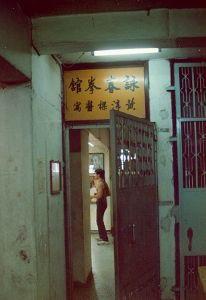
I walked in and noticed someone practicing the dummy and another doing Siu Nim Tao. Another group of people was sitting at a table playing Mahjong. For me it was quite clear. This was going to be just a short visit. I asked the ‘eldest’ person at the table if it was possible to come in and train. A guy in ‘Cathay Pacific’ t-shirt was doing the translation for him. “Come back tomorrow.” he replied. Of course I explained that my plane was leaving that evening and I could not come in the next day. I also mentioned that the owner of the store gave me the address.
Wong Shun Leung then asked me what happened to my hand, and I briefly explained what has happened and finally got his interest. He asked me why I wanted to learn Ving Tsun. I told him that I read lots of good things about this fighting system.
As I used to be an avid practitioner of Taekwondo, in all the other schools I visited in Hong Kong, I asked the trainer to respond to my kicks. But no one was able to show me a good solution. I was not convinced and rather skeptic. So I asked the same thing again here. Wong Shun Leung agreed and after his approval I made some kicks in the air. Wong Shun Leung, wearing jeans and a casual jacket, did not respond to my kicks at all! He simply replied; “You’re to far away, you can’t hit me!” I came closer and kicked again. Now he suddenly responded to my next kick and stepped in until he was about two inches away from my face. He now replied: “This is to close!” When I went back to make space for another kick, he pushed me and I immediately started to fall towards the floor. He grabbed me with one hand, preventing me to fall down and said: ”Your balance isn’t that good either.” With his other hand, I now noticed, he was holding a cigarette and moved it towards the ashtray to tap of the ash before he would bring me back on my both feet.
He encouraged me to repeat it several times. The one thing that I really appreciated is that he treated me with respect during that first ‘encounter’. Other people, of schools I visited before in Hong Kong, really tried very hard to beat me up for real but failed. Wong Shun Leung on the other hand was just ‘playing’ with me! He every time used his Lan Sau on me and placed me at the wall, using a translator to explain my mistake to me, Imagine the position I was in, waiting for the translation! Ha-ha... Then he set me free to launch another attack and I was back at the wall again, with just his fingers on my elbow and with his foot he trapped my foot.
Eventually it was my, to become, Sifu Wong Shun Leung who would find teaching me, in my situation, a real challenge! I cancelled my flight home and from here my journey started. This first trip I eventually stayed for another 3 months.
It was after these 3 months, back in Germany, when I read an article on Bruce Lee and William Cheung that had a group picture of Ip Man with his students. I noticed that it was my Sifu, sitting next to Ip Man! I than realized whom this humble man, carrying the common family name ‘Wong’, really was! It may be clear that this man changed my life forever!
Dave: What was Sifu Wong like?
Philipp: If I had to describe my Sifu, I would say that he would fit the best description of a ‘Gentleman’ and a ‘Fighter’
Dave: You trained in Hong Kong over a long period and you visited several countries to guide Sifu Wong in the early and mid 90's. What is the most valuable lesson you learned trough Sifu Wong in these days?
Philipp: He taught me Ving Tsun in the most efficient way, but the most valuable lesson I learned is that Ving Tsun is not an application, it is a change of your behavior!
Dave: What is the big difference in your opinion, between our Ving Tsun and other, non WSL Ving Tsun, systems?
Philipp: Well…That is too much to answer... everything is different!

Dave: I understand that Sifu Wong used to have a very personal way of teaching. Do you want to share a story on that?
Philipp: As we now understand that Ving Tsun is a change of behavior, Sifu Wong Shun Leung always was focused on helping people to change and correct that behavior. He would always provide guidance to each person based on his or her specific needs and issues. He would give an exercise that would help to correct that specific behavior. This flexibility in teaching is something that made him extraordinary.
Dave: Did Sifu Wong put a lot of emphasis on form training?
Philipp: Yes, training of the forms was really important to him. Also by explaining other exercises, he would always refer to a specific part of the forms that relate to it or to explain the concepts of a certain ‘behavior’.
Dave: What other kind of methods did Sifu Wong use to help someone to progress?
Philipp: Again, that depends on the person and his creativity. For example, he taught me the basics of the Long Pole in a restaurant. Using Chopsticks to explain its tactics!
Dave: How would a typical training session with Sifu Wong look like?
Philipp: His training sessions would of course always start with Siu Nim Tau. Than usually we would condition our selves doing Seung Ma/Toi Ma in Poon Sau. Sometimes the whole evening! Poon Sau would cover a serious part of the training. Some people, depending on the level of experience of course, would also train Chum Kiu, dummy, knives and so on. The wall bag was occupied the whole time! Only the long pole was a bit difficult because of the available space. But we would be able to train outside with it. Everybody knew their mistakes so they also knew what to train to improve. It was clear to us.
When you came in, many things were trained and there were no secrets. No separated classes, or separated levels. Advanced students would help less experienced students. Everybody was able to learn from each other.
Dave: Your training sessions nowadays, do they differ much?
Philipp: No, my training sessions do not really differ much. We start with Siu Nim Tau, Poon Sau, Seung Ma/Toi Ma and so on.
Dave: How much emphasis did he put on Chi Sau, Laap Sau and Gwoh Sau in his training?
Philipp: As these are the main exercises in Ving Tsun, I would say almost 90%
Dave: In the more than 15 years you trained with Sifu Wong, did you see a change in his way of teaching/training?
Philipp: His Ving Tsun became better and better, and his teachings became more detailed.
Dave: Did Sifu Wong ever relate any interesting stories on Ip Man?
Philipp: Usually in class it was all about fighting, but sometimes he had some stories. Usually on Ip Man’s way of thinking and about what type of person he was. Ip Man was said to be a very strong person. He had very powerful fore arms and a strong kick.
Dave: Did Sifu Wong consider strength and conditioning to play an important part in Ving Tsun?
Philipp: Wong Shun Leung mentioned that the first thing you should have, is the guts to fight. Secondly strength and endurance, otherwise you wont survive a fight as you haven’t got what it takes to knock out your opponent. The third is your Ving Tsun skill.
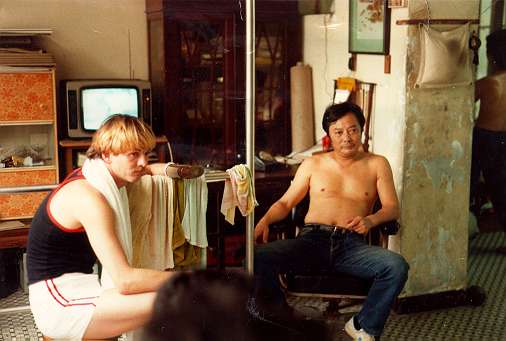
Dave: A lot of people aren't aware of the influence that Sifu Wong had on Bruce Lee's martial arts career, especially as Sifu Wong was a very humble man. Did he ever share any details about their relationship with you?
Philipp: Yes he did, they were very close, like brothers. A famous story, Wong Shun Leung really liked to tell, is the one that Bruce Lee once came early to the school of Wong Shun Leung, waiting outside for the other students to come. He would inform them that Sifu was ill and not able to teach that day. So Bruce could have a private training with him.
Dave: Since his passing, a number of people who barely knew Sifu Wong have claimed to have been his student and claimed to represent WSLVT around theworld. What are your thoughts on this situation and what can be done to ensure that the public is not mislead?
Philipp: When Wong Shun Leung came to ‘the west’ to do seminars, many people made pictures with him and later claimed to be his students. Even an ‘old friend’ of mine. He offered me his place to organize a seminar and he came to Hong Kong with me for a week. Now he’s claiming several things and falsely moved himself up the ladder. These things are very hard to prove. But you can simply see the style and what they are doing. They usually have very different, non Wong Shun Leung system like explanations. After time, people will know and these charlatans cannot hold up their ‘stories’. There is nothing we need to do. ‘Nature’ will handle it.
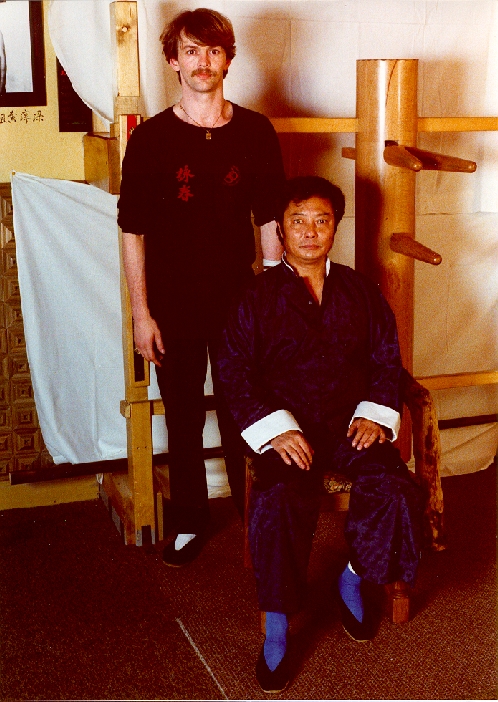
Dave: Sifu Wong was a keen boxing enthusiast, what do you think he would have made of MMA and its huge popularity today?
Philipp: I think Wong Shun Leung would have appreciated MMA. But he clearly knew how to separate ‘sport’ and ‘fighting’. If he was talking about ‘fighting’, everything was clear to him. Your opponent might not have the ‘suitable’ weight. He might not come alone. There are no rules! So the ‘thinking’ is different. There is no judge who can help you, when you’re on the ground. All influence of Ving Tsun is based on these situations. Because Wong Shun Leung had some, really tough fights himself, his thoughts on ‘real’ fighting were very straightforward. The scarf on his head, from a knive used in a street fight, used to be a silent witness of that.
If you go into the ring or cage, everything is pre arranged. All conditions are set. Of course it is not a bad thing to do. Wong Shun Leung also participated in competition fights under a fixed set of rules. It will not make you ‘stupid’ when you turn the gloves on. It will definitely bring you experience. But whenever Wong Shun Leung talked about fighting, it was always about ‘real’ fighting under unknown conditions.
Dave: If you had to sum up in a line, what Sifu Wong had taught you, what would it be?
Philipp: There are some things he regularly used to say like:
“Watch your stance. Ving Tsun starts at the ground in a correct position to transfer the ‘force”! He also used to say: “If you want to do something against force, you have to know what force is.”
If you have never experienced what force is, and it suddenly comes…you might end up f*ck*d, you know? You can’t handle it. Your body will become confused. Just like in fighting, You get hit! You have to know what it is, before getting hit for real! In ‘real’ fighting, the possibility you get hit is ‘much larger’ than ‘not getting hit. That’s why I think sparring is important. When soldiers go into a ‘maneuver’ and they screw up, they should definitely not go to war! When you want to ‘survive’ a real fight you have to make many ‘maneuvers’ first. You have to spar. But before sparring…you need Ving Tsun skills first.
Dave: Do you have trust that the WSL approach is preserved for the next generation?
Philipp: Yes, I’m confident that there are intelligent people around that are able to teach it in the right way for the next generation.
Dave: What do you think about the worldwide quality of WSLVT nowadays? Is the best Ving Tsun quality still found in Hong Kong today?
Philipp: I don’t know, as I didn’t travel to Hong Kong for a while…
Dave: A lot of people wonder what happened with you, losing your hand. Didn’t it obstruct your Ving Tsun practice?
Philipp: I lost my hand during a tragic accident I had during an explosion. Of course... I miss one hand and that is a problem. But I learned to live with that fact. But my Ving Tsun would have been better for sure!
Dave: What do you think is the big difference between learning Ving Tsun when you started and learning Ving Tsun today?
Philipp: There is no difference...Ving Tsun is still the same, only people’s behavior changed. For learning Ving Tsun you have to move your ass to the gym like with any other sport!
Dave: If you could ask Sifu Wong one last question, what would it be?
Philipp: Can you check my Chi Sao?
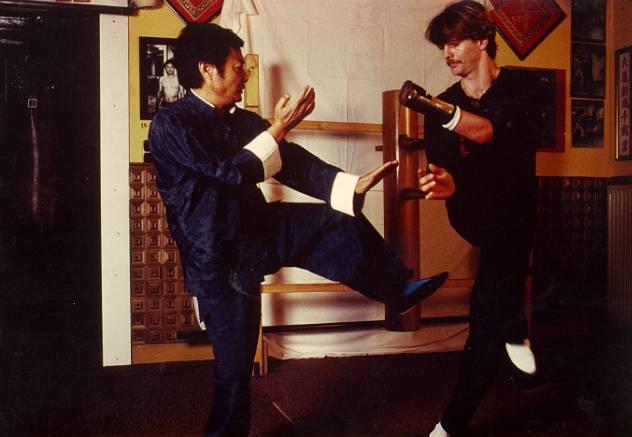
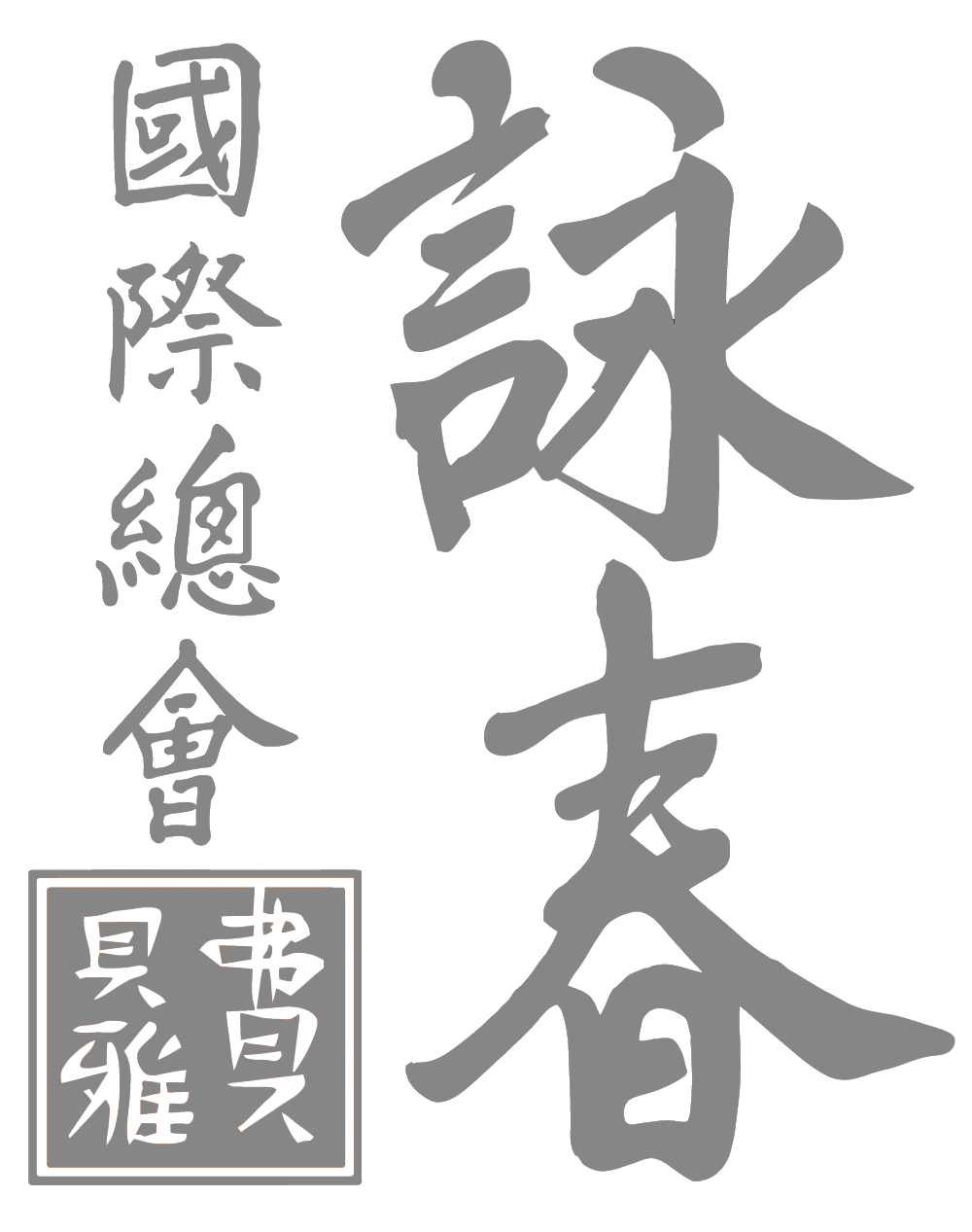
Meer info/More info?
Tel: +31 (0)6 2043 6015
Mail: info@wslvt.nl



